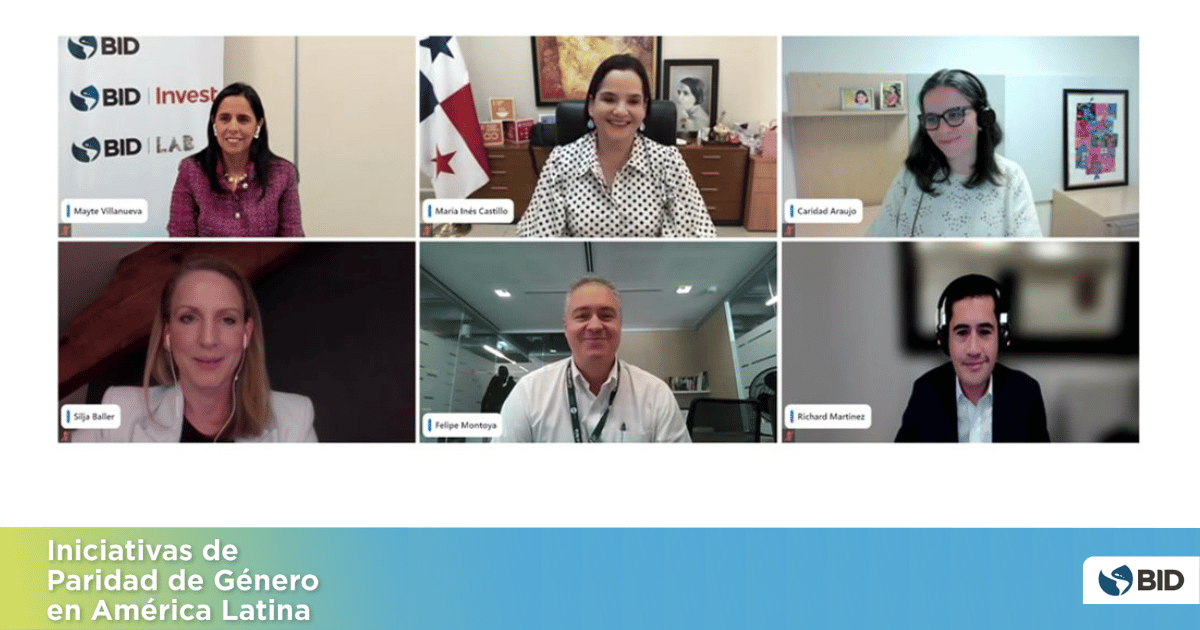In 2016, the Inter-American Development Bank (IDB) and the World Economic Forum (WEF) partnered to develop Gender Parity Accelerators (IPGs, for its name in Spanish) in Latin America. The French Development Agency (AFD, for its name in Spanish) joined this collaboration in 2019.
IPGs brings together key actors from the public and private sectors and involves a wide range of companies and stakeholders from government and civil society. They work together to promote gender equality in the labor market. The main added value of IPGs is to facilitate a fluid dialogue among key actors, stimulate joint actions, and share best practices to advance towards parity.
As the first seven years of implementing Gender Parity Accelerators in the Latin American region are completed, the IDB published the document “Gender Parity Accelerators in Latin America 2016-2022: A Public-Private Partnership to Accelerate Equality” (soon available in English). This analyzes the journey taken by IPGs and proposes measures to strengthen the model. In a previous blog, some of the lessons learned by IPGs in the region were highlighted. Below, you can read about some of the highlighted results of these initiatives.
Results of the Gender Parity Accelerators
Through IPGs, significant progress has been made in promoting gender equality in the labor market.
Some of the achievements include:
1. Policy Changes
In Colombia, a study conducted within the context of IPG influenced the government’s decision to extend paternity leave from eight days to two weeks in July 2021. Such reforms contribute to increased participation of fathers in childcare activities and mothers in the labor market. In Panama, the IPG contributed to the design of the “Política Empleabilidad e Inserción Laboral de las Mujeres en condiciones de vulnerabilidad socioeconómica” (Employability and Labor Insertion Policy for Women in conditions of Socioeconomic Vulnerability), approved in 2021 with the aim of promoting the country’s economic recovery after the COVID-19 pandemic. The leading entity that drove the policy was the Ministry of Labor and Labor Development (MITRADEL).
2. Scalable Pilot Projects
In the Dominican Republic, the IPG successfully conducted a gender-focused telecommuting pilot at the Directorate of Public Procurement and Contracts. This initiative was implemented in collaboration with Microsoft in response to the COVID-19 lockdown. A remote assistance protocol was developed to provide online services, reducing the need for in-person services and promoting better work-life balance. It is estimated that this initiative saved approximately USD 220,000, a model that is still in place and involves 17% of the employees in the Directorate.
In Costa Rica, under the IPG, the “Gane, Gane, Gane ” (Win, Win, win) pilot was launched with the support of the IDB, the Early Childhood Development Innovation Fund, the DEHVI Foundation, the Business Alliance for Development (AED), and United Way. This project contributed to positioning corporate responsibility as a strategy for sustainability and quality in early childhood care. By July 2022, eight private sector companies had established co-payment systems to partially subsidize the cost of early childhood care services for their female employees.
3. Commitment from Over 550 Private Sector Companies
The IPGs implemented an approach strategy to the business sector. After joining an IPG, companies committed to promoting gender equality internally made various advancements. For example, they diagnosed their gender gaps, designed policies to close them, and measured progress and results, with the support of the IPGs Technical Secretariats. In Chile, between 2016 and 2020, more than 180 companies adopted measures to improve job quality and close wage gaps. These measures affected over 130,000 women, equivalent to 7% of salaried individuals in the country’s private sector. The report “50+ Empresas Agentes de Cambio”(50+ Change-Agent Companies) highlighted that companies committed to IPGs had a higher presence of women and lower gender wage gaps compared to the country’s average.
In Colombia, the Ministry of Labor and Grupo Éxito developed and launched in 2022 a toolbox called “Equi-Rutas.” This project aimed to help companies learn about good business practices, adopt tools to diagnose their gender gaps, and receive support on how to close them. Currently, the 105 IPG member companies in Colombia use this toolbox.
4. Decision-Making Knowledge
The IPGs supported the development of a document characterizing gender economic gaps for the informed elaboration of each country’s IPG Action Plan. Of the nine documents prepared, four were published: : Chile (2016), Panamá (2018), Colombia (2019) and the Dominican Republic (2019), and two are in the process of publication, in Honduras and Mexico.
New Horizons for Gender Parity Accelerators
The Gender Parity Accelerators has succeeded in creating a regional, innovative, and collaborative methodology to close gender economic gaps. It has also engaged the main economic actors in the countries and coordinated the work of international organizations and civil society. As a result, it has facilitated informed decision-making through knowledge generation and dissemination. Ultimately, it has become a useful platform for countries wishing to advance gender equality.
Countries that have recently joined an IPG, such as Ecuador, Honduras, and Mexico, are working on action plans with fewer measures. These plans focus on:
- Economic sectors with growth potential
- Emphasizing the development and financing of pilots with fast cycles of continuous improvement
- Evaluation to close gender economic gaps
Results of the actions driven by GPA in these countries are expected to be known shortly. In summary, these initiatives have laid the foundation for greater gender equity in the region. GPA continues to open the door to a future where men and women have equal opportunities in the workplace.


Leave a Reply